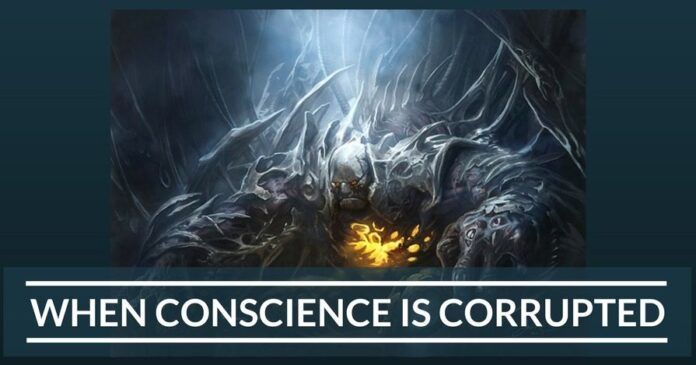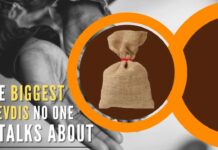
A clear conscience keeps one in a state of peace, even if troubled by the lack of material well-being
There is an old Tamil proverb which says, “You can rouse a person who is asleep to wake up but not one who is pretending to be asleep”.
People are born with good and bad tendencies. We live our lives, allowing some and transcending others
The world is built on a maze of ideas. They begin with the quest for survival and evolution. As mortality looms over each human body, this battle is fought in service of others – children, family, friends, communities, nations and the widening arc of concentric circles that finally encompass the entire species. The tightening of supply to feed this fundamental human tendency to flourish, like the short burst of the brilliance of a dying flame, results in the intensification of competition. From the overwhelming desire to win against all odds, is born the tool of corruption.
“People are born with good and bad tendencies. We live our lives, allowing some and transcending others, warming our hearts and shaping our destinies.”
Are we inspired and accepting of life as it unfolds? Or driven by an unknown fear to reshape the world into our image of happiness? It is this choice that determines the way we live.
A fearful pawn
There was a story in the newspaper with an accompanying photo. A young bank officer was in tears with a three-year-old baby girl in his arms. Surrounded by family members whose faces carried an uncertain mixture of pain and shame.
Sampath was a young graduate from a middle-class family with a dream job at a bank. The prospect of a better life seemed imminent. He had small aspirations for a house to call his own, a scooter and a good school for his daughter. With time, they included access to medical facilities in the city for his parents and a bridegroom for his only sister. And later, the accumulation of small savings that would insulate him from the whims of uncertainty.
He was an honest and hard-working person. Rumours about the corrupt activities that occurred unseen in the course of the operations of the bank came to his attention. The quick riches that had come their way were evident in the homes of some of his colleagues.
He was not an activist, to fight the machinations of powerful officers. It would cost him his job and his entire future. There were more privileged people to play that role. He had priority commitments that he had to fulfil.
So, in the beginning, he turned a blind eye. Then his mother had a heart attack and was advised surgery. His sister’s marriage kept getting postponed until they had the wherewithal to host it.
Pushed to a corner, he made his first small hidden transaction. A small payoff to quickly approve a loan, glossing over some minor gaps in the paperwork. He slowly waded into unchartered waters. He lost his sleep initially, his mind tormented by a string of fears. But with each undetected day that passed and each loan that was successfully returned, his fear turned into confidence and finally into insensitivity.
The network of power within the bank looked for the weakest link to offer as a sacrificial lamb
The extra money fulfilled so many of the basic needs that humans need to find happiness. His family life took a turn for the better – his mother regained her health, his sister got married, and the child was sent to a reputed school. He was comfortable with who he had become. His actions were a non-violent crime that protected his family and helped his customers. Others around him were doing even more. He was a small fish in a large ocean that included almost everyone around him.
Initially, his wife had mild suspicions about the newfound surge in wealth and questioned him. He deflected them with explanations she could not understand. She allowed herself to be reassured by her trust in him, gave up her enquiries and instead learnt to enjoy the small joys of her new lifestyle. The parents back in their village were proud of their son, who had been faultlessly hard working since childhood. He was earning the fruits of years of effort and they prayed for God’s blessings to remain on him.
Until his branch suffered a large loan default. The network of power within the bank looked for the weakest link to offer as a sacrificial lamb. In Sampath, they found the perfect candidate.
He was put through an investigation that exposed the trail of bribes that had accumulated into a pile, disproportionately more than his modest salary.
He was fined and sentenced to 5 years in prison. He would complete that sentence and return to a world devoid of the same possibilities. His home was auctioned to encash part of the fine. His wife and daughter moved back to his village. Television and newspapers splashed stories that portrayed him, a pawn, as a manipulative kingpin. His mother died of shame and shock a few weeks after this incident and his father followed soon after. The daughter returned to the same government school that he studied in. The classrooms were filled with noise and activity. The teachers had marked their attendance in the morning and left. The children grew up in the untouched cradle of their own destinies.
A simple leader
As a young girl, I first heard of Lal Bahadur Shastri because of the “Miss a Meal” program. In the midst of the 1965 war, the nation was facing an acute food shortage. He decided to skip his evening meals and served his children only milk and fruit instead. After a week he was certain that he could survive without a meal a day. He then besseched the nation to forgo a meal a week to help tide over the food crisis. He was a role model that people followed.
His integrity, simplicity and austerity stood out. While he was jailed under the British, he received news that his daughter was unwell. His request for fifteen days leaves was granted under the condition that he should not participate in any freedom struggle related activities. His daughter died before he reached home. After performing the funeral and last rites, he returned to the jail in three days, to honour his commitment with the Jail authorities he was fighting against.
Shastri converted his own lawn at his official residence into a farm where he grew his own crops. He was often referred to as India’s farmer prime minister. He led Indians towards a green revolution by his own personal example, the most powerful act of leadership.
Once, as Prime Minister, he visited a Textile Mill. After his tour, he requested to be shown some sarees. The initial lot was priced between Rs. 800-1000. Shastri asked for a cheaper variety to be shown to him. These were priced around Rs. 400. He then said he wanted to buy one as a gift for his wife but could not afford these prices and wanted something cheaper.
The Mill owner said it would be his Privilege to gift one to the PM. To which Shastri replied, “Being the PM does not mean that I accept all those things I cannot afford and give them to my wife. Although I am the PM, I am a man of limited means. Please show me some cheaper sarees. I will buy what I can afford.”
At the time of his death, he did not own a house. His only personal possession was a car purchased with a bank loan. He was born poor, led a simple personal life, an ethical profession life and died with honour and dignity.
Rediscovering the gift of simplicity
In the Mahabharata, Yama disguised as a Yaksha asks Yudhishthira to share what he finds most surprising in the world. Yudhishthira responds with gentle compassion, “Day after day, countless lives enter into the Temple of Death. And day after day the rest of us look upon this spectacle, still believing ourselves to be permanent & immortal. Can anything be more surprising than this?”
Know that all sins and all evils can be summed up in that one word, weakness. It is a weakness that is the motive power in all evil-doing; it is a weakness that makes men injure others, or try and gain at another’s expense. It is a weakness that makes them manifest what they are not in reality.
The best guide in life is a strength. Strength is born out of living by Dharma and courage. All the strength and succour you want is within you. Let positive, strong, helpful thoughts enter into one’s brain from childhood. Lay yourself open to these thoughts, and not the ones that weaken and paralyze.
We must remember that all it takes is to rediscover the joys of simplicity and contentment within ourselves
Finally, life and living is a matter of choices in which our conscience plays a pivotal part. A clear conscience keeps one in a state of peace, even if troubled by the lack of material well-being; a troubled conscience will make life hell, even when surrounded by material plenty.
To understand the nature of this conscience and to keep it clear and limpid we need to understand what the fundamental values of human life and living are. We need to listen to our inner voices to live by these values.
No economy can progress without a basic level of integrity amongst its citizens. No amount of fiscal and economic policy can substitute a sound moral fibre – the pride and honour of any country. Holistic development is correlated to this spirit amongst people.
While we are often inundated with a sense of hopelessness at the pervasive stench of corruption around us, we must remember that all it takes is to rediscover the joys of simplicity and contentment within ourselves. Choices become habits and travel around the land until they create new islands of hope and renewal around people. And in the fullness of time, people inspired by this message would once again rise to lead this land by their own example.
Note:
1. The views expressed here are those of the author and do not necessarily represent or reflect the views of PGurus.
- Corona and consciousness - April 15, 2020
- When conscience is corrupted - February 14, 2018
- From 2G to Jio: The Last Laugh in Telecom - December 26, 2017











I couldn’t control myself from appreciating this article. Yes, we have to rediscover the joy of simplicity and honesty.
Along with Neethi Kathalu said by our grand parents, Such examples of real life people should be shown to students from young age. They will atleast be conciousness of posibility of living by that standards.
A good piece on LB shastri. I think it should find a place in primary school text books so that people know the greatness of this man
It is a very good article. I also realise that being corrupt is easy even for a common man, while being pure requires a great deal of patience, patience to realise who you are and what you do really want.
Great article!